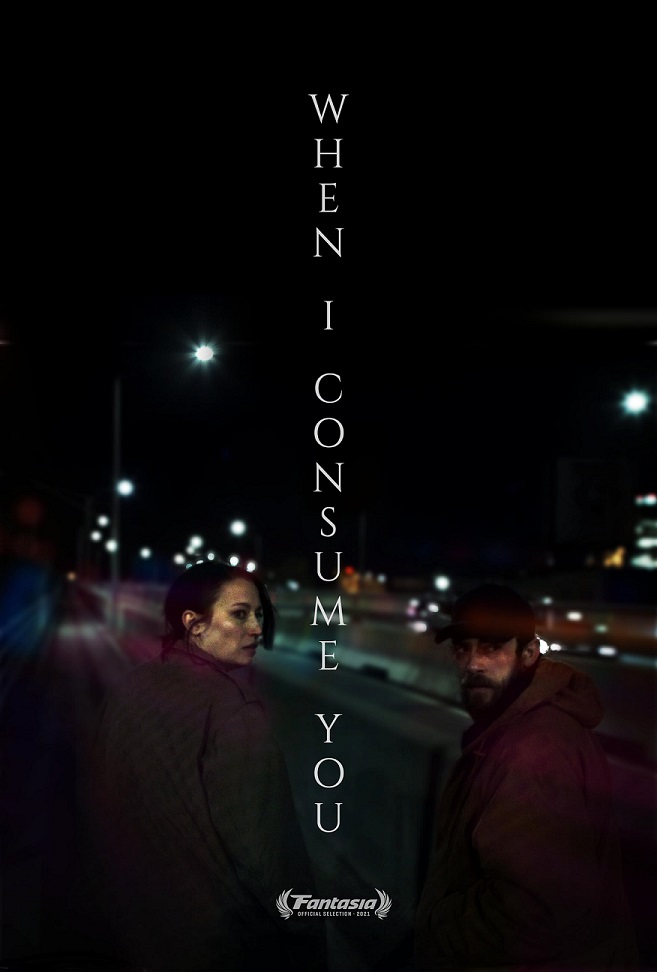Director Perry Blackshear has a fixation on the quiet voices we often hear whispering into our heads. His debut feature, THEY LOOK LIKE PEOPLE, explores the mind of a man who believes that humans are being taken over by creatures only visible to him. He is alerted to this by the voice in his head, who is often a woman. The conflict in the film arises when the viewer is faced with the possibility that our hero is unreliable. This suspicion is bolstered by his interactions with his best friend, who is visibly worried about both his mental state and the future if their relationship. In his sophomore picture, SIREN, Blackshear is able to fully indulge in his love of quiet voices flowing through our ears at the speed of slowly falling rain. It tells the story of a man, seduced by the voice of a magical woman. Now, with his third feature WHEN I CONSUME YOU, Blackshear cements his status as a filmmaker enraptured by the power of the female voice.
WHEN I CONSUME YOU is the story of Wilson (Evan Dumouchel) and Daphne Shaw (Libby Ewing), two siblings whose relationship is fraught with tension from past trauma. Daphne responds to the pain with a desperation for adopting a child and starting a family of her own. Wilson takes the opposite approach, withdrawing into himself while carrying fear for everyone around him. Their dynamic is a codependent one, with Daphne acting as a surrogate parent for her brother. She does this put of love, but there’s pity there too — She doesn’t believe he can take care of himself.
The world they live in is covered in darkness, with no hope or light to give us reprieve from the sibling’s dour outlook. The world looks how they feel — marred in shadow and uncertainty, haunted by their very worst fears. Dumouchel and Ewing often look on the brink of tears, as if the weight of the weight of the world rests heavy on their shoulders. Blackshear drops us into a world straight out if noir, with the threat of violence always looming.
Then tragedy strikes, forcing Wilson into action. Daphne is murdered and he’s the only one who can find out what happened and seek justice. It becomes a singular obsession, bolstered by the voice of his sister in his head. In the afterlife, Daphne speaks like a cruel taskmaster, using negative reinforcement to push her brother to be more assertive and violent. She tries to mold him into the prototypical cinematic hero — strong and silent with imposing strength. It’s as if she’s the voice of masculinity itself, taunting him for being emotional and withdrawn. It’s a queasy dynamic to have a woman be the voice of toxic masculinity, especially as we see it destroy Wilson whose anxiety is painted as a fatal flaw.
It’s difficult to tell if Blackshear truly believes in Daphne’s words or is using her to represent the kind of negative self-talk men use to push themselves towards violence. Daphne’s ghost berates her brother, repeatedly calling him weak. And as the film goes on, Wilson transforms into a ball of volatile masculinity, thirsty for blood. When he finally does encounter the killer, it feels otherworldly. It soon becomes clear that in order to avenge Daphne, Wilson must fight a monster. But is any of this really happening? Is it a monster or is it just how Wilson sees the world? And is the sister in his head real either? The answers to these questions determine the purpose of the film. Without them we are left with vague gestures towards mental illness. Perhaps the monster is trauma itself and the black hole of despair that can swallow you whole if you let it. This would mean that Daphne succumbed to her own depression and wants to save her brother from the same fate. But if that’s the case, then why make Daphne’s voice the most monstrous?
Tags: Drama, Evan Dumouchel, Horror, Libby Ewing, MacLeod Andrews, Margaret Ying Drake, Mystery, Perry Blackshear, supernatural





No Comments